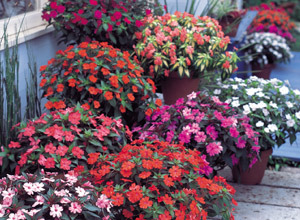We are approaching the time when gardeners should buy their annuals — but not put them in the ground yet. Bring them home, put them outside during the day and bring them into the garage at night to keep them safe from low temperatures.
This has been a cold spring — and I am not saying so just because the spring last year was so warm.
I almost had enough asparagus for a meal by May 15 (I remember because it is my favorite vegetable, and I like it on my birthday), but this year we had only about three spears.
The lilacs are later than they have been in years. The ground and the air are both cool.
The traditional date for planting annuals and other warm-weather plants like tomatoes and peppers is Memorial Day. But unless you see a warm extended forecast on Memorial Day weekend, I’d advise waiting until the weekend of June 1 this year.
But there are a lot of new and interesting, as well as tried and true, annuals available for gardeners.
Allan Armitage, an herbaceous-plant professor from the University of Georgia and a well-known garden writer, spoke about annuals way back in January at the Maine Landscape and Nursery Association in Augusta.
I didn’t write about it then because I figured you’d all forget about it by the time it was warm enough for you to buy your plants — at least, I know I would have.
Annuals are color. Perennials — the other Armitage talk at the MELNA meeting — have the advantage of living from year to year, and most of them bloom for several weeks each year.
Annuals in many cases bloom from the time you put them in the garden until they are killed by the first frost in the fall.
“Annuals are the No. 1 fastest selling group of plants,” Armitage said. “Color is the No. 1 reason people buy plants.”
A lot of the MELNA audience is people who sell plants, and part of the talk was marketing.
“I’ve never met an old gardener,” he said. “You can’t get old when you look to the future, and we sell the future.”
Back in January when Armitage spoke, Maine garden professionals were just learning how bad impatiens downy mildew was going to be this year.
If you haven’t read about it, it means that people are not going to be able to grow the typical impatiens and double impatiens.
“There is not a lot of substitute for color in the shade,” he said. “Begonias will do it. New Guinea impatiens will be a major plant, but it is not as shade tolerant. SunPatiens will grow in full sun, but to replace impatiens, choose the shorter ones. They are more shade tolerant.”
Enough of the philosophy. It is time to get to specific plants.
Angelonia “Carita Raspberry” has great color, and “Serena White” is a dwarf that never falls over. Argyranthemum “Flutterby Yellow’ is “weather tolerant. It takes both the heat and the cool.”
Begonias are “the most resilient annual we have,” Armitage said, mentioning “Whopper Red,” “Ikon Bush White,” “Bonita Shea,” and especially “Edinburgh” for — and the name therefore seems odd — “its tropical look.”
Euphorbias became a hot plant when “Diamond Frost” came out a few years ago, although the most popular euphorbia is the Christmas poinsettia. “Breathless Blush” and “White Manuus” are better than “Diamond Frost.”
He loves gaillardia, mentioning “Sunburst Tangerine,” “Gallo Peach,” “Georgia Yellow” and “Mesa Yellow.” “They want sandy soils,” Armitage said, “and they don’t like sprinkler systems.”
He likes Heliotropium “Scentopia Dark Blue” because it is the first one with a flower that has a scent.
Osteospermum love it cool, and some good ones are the Crescendo series and “Tradewinds Purple.”
Allyssum “Snow Princess” is a great plant, and lasts longer into the summer than other allyssum.
“You can’t go wrong with coleus,” he said, mentioning “RedHead,” “Henna,” “Wasabi” and “Mariposa.”
If you want to look at more photos, Armitage suggested that you go to horticultureimages.com. To learn more about Armitage, go to allanarmitage.net.
Tom Atwell has been writing the Maine Gardener column since 2004. He is a freelance writer gardening in Cape Elizabeth and can be contacted at 767-2297 or at:
tomatwell@me.com
Copy the Story Link
Send questions/comments to the editors.



Success. Please wait for the page to reload. If the page does not reload within 5 seconds, please refresh the page.
Enter your email and password to access comments.
Hi, to comment on stories you must . This profile is in addition to your subscription and website login.
Already have a commenting profile? .
Invalid username/password.
Please check your email to confirm and complete your registration.
Only subscribers are eligible to post comments. Please subscribe or login first for digital access. Here’s why.
Use the form below to reset your password. When you've submitted your account email, we will send an email with a reset code.